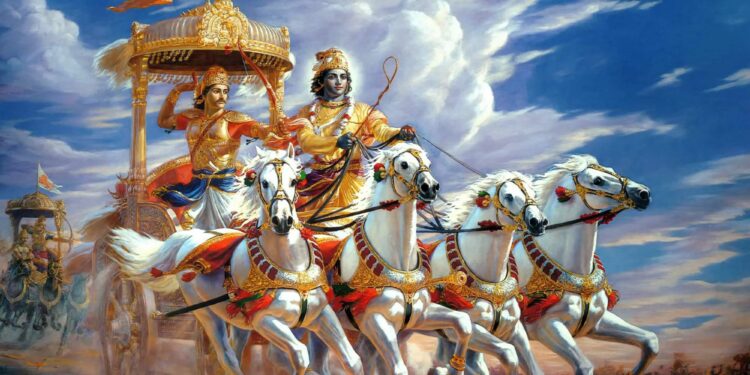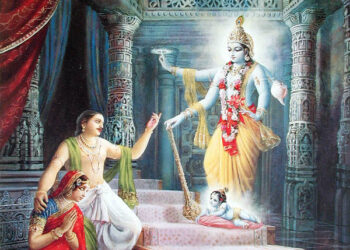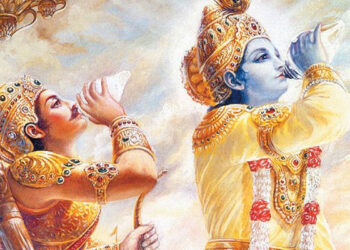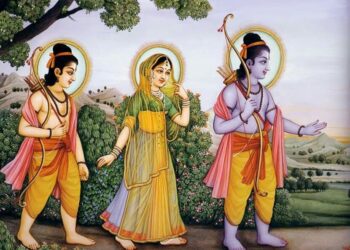TEXT 52
yadā te moha-kalilaṁ
buddhir vyatitariṣyati
tadā gantāsi nirvedaṁ
śrotavyasya śrutasya ca
SYNONYMS
yadā—when; te—your; moha—of illusion; kalilam—dense forest; buddhiḥ—transcendental service with intelligence; vyatitariṣyati—surpasses; tadā—at that time; gantā asi—you shall go; nirvedam—callousness; śrotavyasya—toward all that is to be heard; śrutasya—all that is already heard; ca—also.
TRANSLATION
When your intelligence has passed out of the dense forest of delusion, you shall become indifferent to all that has been heard and all that is to be heard.
PURPORT
There are many good examples in the lives of the great devotees of the Lord of those who became indifferent to the rituals of the Vedas simply by devotional service to the Lord. When a person factually understands Kṛṣṇa and his relationship with Kṛṣṇa, he naturally becomes completely indifferent to the rituals of fruitive activities, even though an experienced brāhmaṇa. Śrī Mādhavendra Purī, a great devotee and ācārya in the line of the devotees, says:
sandhyā-vandana bhadram astu bhavato bhoḥ snāna tubhyaṁ namo
bho devāḥ pitaraś ca tarpaṇa-vidhau nāhaṁ kṣamaḥ kṣamyatām
yatra kvāpi niṣadya yādava-kulottaṁsasya kaṁsa-dviṣaḥ
smāraṁ smāram aghaṁ harāmi tad alaṁ manye kim anyena me
“O my prayers three times a day, all glory to you. O bathing, I offer my obeisances unto you. O demigods! O forefathers! Please excuse me for my inability to offer you my respects. Now wherever I sit, I can remember the great descendant of the Yadu dynasty [Kṛṣṇa], the enemy of Kaṁsa, and thereby I can free myself from all sinful bondage. I think this is sufficient for me.”
The Vedic rites and rituals are imperative for neophytes: comprehending all kinds of prayer three times a day, taking a bath early in the morning, offering respects to the forefathers, etc. But when one is fully in Kṛṣṇa consciousness and is engaged in His transcendental loving service, one becomes indifferent to all these regulative principles because he has already attained perfection. If one can reach the platform of understanding by service to the Supreme Lord Kṛṣṇa, he has no longer to execute different types of penances and sacrifices as recommended in revealed scriptures. And, similarly, if one has not understood that the purpose of the Vedas is to reach Kṛṣṇa and simply engages in the rituals, etc., then he is uselessly wasting time in such engagements. Persons in Kṛṣṇa consciousness transcend the limit of śabda-brahma, or the range of the Vedas and Upaniṣads.
TEXT 53
śruti-vipratipannā te
yadā sthāsyati niścalā
samādhāv acalā buddhis
tadā yogam avāpsyasi
SYNONYMS
śruti—of Vedic revelation; vipratipannā—without being influenced by the fruitive results; te—your; yadā—when; sthāsyati—remains; niścalā—unmoved; samādhau—in transcendental consciousness, or Kṛṣṇa consciousness; acalā—unflinching; buddhiḥ—intelligence; tadā—at that time; yogam—self-realization; avāpsyasi—you will achieve.
TRANSLATION
When your mind is no longer disturbed by the flowery language of the Vedas, and when it remains fixed in the trance of self-realization, then you will have attained the divine consciousness.
PURPORT
To say that one is in samādhi is to say that one has fully realized Kṛṣṇa consciousness; that is, one in full samādhi has realized Brahman, Paramātmā and Bhagavān. The highest perfection of self-realization is to understand that one is eternally the servitor of Kṛṣṇa and that one’s only business is to discharge one’s duties in Kṛṣṇa consciousness. A Kṛṣṇa conscious person, or unflinching devotee of the Lord, should not be disturbed by the flowery language of the Vedas nor be engaged in fruitive activities for promotion to the heavenly kingdom. In Kṛṣṇa consciousness, one comes directly into communion with Kṛṣṇa, and thus all directions from Kṛṣṇa may be understood in that transcendental state. One is sure to achieve results by such activities and attain conclusive knowledge. One has only to carry out the orders of Kṛṣṇa or His representative, the spiritual master.



















